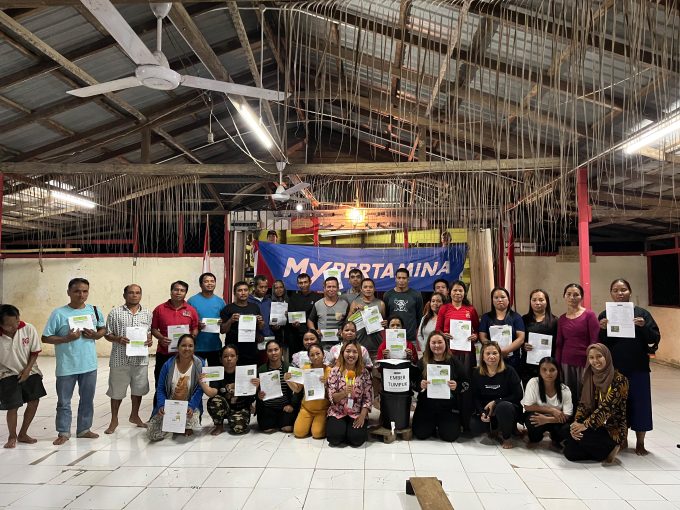
One of the Agricultural Microbiology students from the 2021 cohort, Erina Tika Febiyanti, who is commonly known as Erina, has just completed her Community Service-Learning and Community Empowerment Program (KKN-PPM) for the second period of 2024 in Dusun Badat Lama, Suruh Tembawang Village, Entikong Sub-district, Sanggau Regency, West Kalimantan. This KKN activity is a mandatory course that provides students with the opportunity to directly apply their field of study to help solve problems that arise in the community. According to Erina, the KKN program encourages students to broaden their perspectives, engage dynamically with the community to observe existing challenges, and solve those challenges by empowering local residents. Erina believes that the 50-day period for the community service program is not enough to fully resolve all the existing issues, but it is sufficient to initiate positive change, both for herself as a student and for the community to become more empowered in improving their well-being.
Dusun Badat Lama, where Erina carried out her community service, is located deep within the forests of West Kalimantan, directly bordering Malaysia. The extreme road access to the location did not dampen Erina’s enthusiasm to serve in this place. The majority of the residents in Dusun Badat Lama are farmers, managing vast areas of land. However, due to the remote location, agricultural extension services have not yet reached this area, and access to fertilizers and pesticides is also difficult. Internet and electricity signals are very limited, making it challenging for the community to gain agricultural knowledge from the internet.
Based on these conditions, as an agricultural student, Erina focused her work program on applying agricultural techniques to improve agricultural productivity, starting from educating on plant cultivation methods to producing liquid organic fertilizers and botanical pesticides. Erina hopes that the work program she brings will help the community increase their agricultural productivity. “We learn from each other. I often join the community in the fields to learn agricultural practices. In return, I also share a bit of the knowledge and agricultural theories I learned in college with the community through education and discussion,” Erina explained.
Erina realizes that the success of these programs cannot be achieved without the full support of all layers of the surrounding community. Through this community service activity, the most important value to be learned, according to Erina, is that differences in ethnicity, race, and culture between students and the community do not hinder the spirit of collaboration. Instead, they expand perspectives when discussing solutions to encountered problems while still prioritizing local wisdom. This synergy is strong evidence of achieving SDG 1: No Poverty, SDG 2: Zero Hunger, SDG 8: Decent Work and Economic Growth, and SDG 11: Sustainable Cities and Communities.
Author: Erina Tika Febiyanti
